Decoding Air Conditioner Maintenance: How Often is Necessary?
How often should you be servicing your air conditioner to keep it in optimal shape?
How often should you be servicing your air conditioner to keep it in optimal shape?
Are you experiencing the frustrating problem of your AC blowing warm air when it should be cooling your home?
Proper HVAC maintenance is essential for keeping your home cool and comfortable during the hot summer months. In this blog post, we will discuss 9 reasons your air conditioner deserves an early tune-up!
While regular maintenance and repairs can help keep your furnace running efficiently, there comes a point when furnace replacement becomes necessary. In fact, upgrading to a new furnace could be the best decision you make this winter, both for your comfort and for your wallet.
Are you experiencing sky-high energy bills despite not using any more electricity than usual? If so, your furnace may be to blame. With the winter months bringing colder temperatures and more frequent use of your heating system, it’s important to make sure your furnace is operating efficiently and not costing you more money than necessary. Regular maintenance and repair are key to avoiding unnecessary furnace repair costs. Read on to learn more about how to keep your furnace running smoothly and your energy bills low.
Your furnace plays a significant role in your energy consumption, especially during the cooler months, and can greatly impact your monthly bills. During the winter, for example, your furnace works tirelessly to keep your home warm. But if it’s not operating efficiently, it can consume more energy than necessary. This means your energy bills will reflect the extra energy your furnace is using.
Regular maintenance is crucial to ensure your furnace is operating at its best. Cleaning or replacing filters, checking and adjusting thermostat settings, and inspecting the furnace for any wear and tear can go a long way in improving efficiency and reducing energy costs.
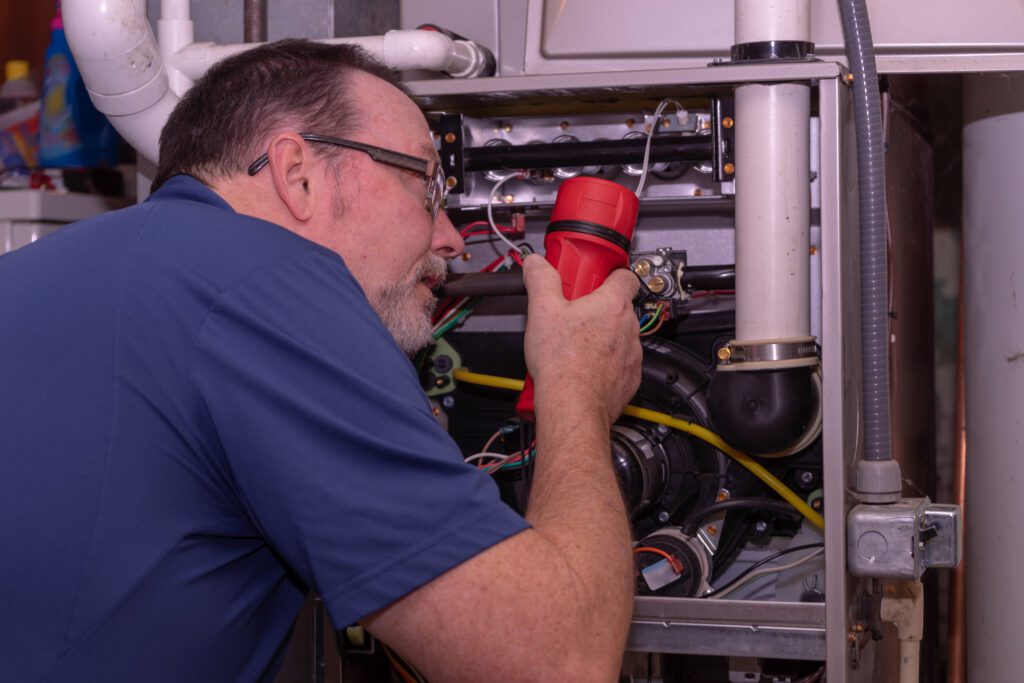
Maintaining your furnace ensures it will always operate at peak performance.
Now that we understand the relationship between your furnace and energy costs, in the next sections, we will explore the signs that indicate your furnace is to blame for high energy bills, the reasons why this may be happening, and effective solutions to improve your furnace’s efficiency and lower your monthly utility payment.
As much as we rely on our furnaces to keep us warm during the winter months, as mentioned, you want to ensure they’re in tip-top shape. Look out for these signs:
If you notice any of these signs, it’s important to have your furnace inspected by a professional. They can diagnose any problems and provide solutions to improve your furnace’s efficiency and lower your energy bills.
As much as we rely on our furnaces to keep us warm during the winter months, they may be other reasons behind monthly “sticker shock” in the winter. Let’s take a closer look.
One possible reason is poor insulation. If your home is not properly insulated, the warm air generated by your furnace can easily escape, forcing your furnace to work harder and consume more energy in order to maintain a comfortable temperature. Insufficient insulation in the walls, attic, or windows can all contribute to this problem.
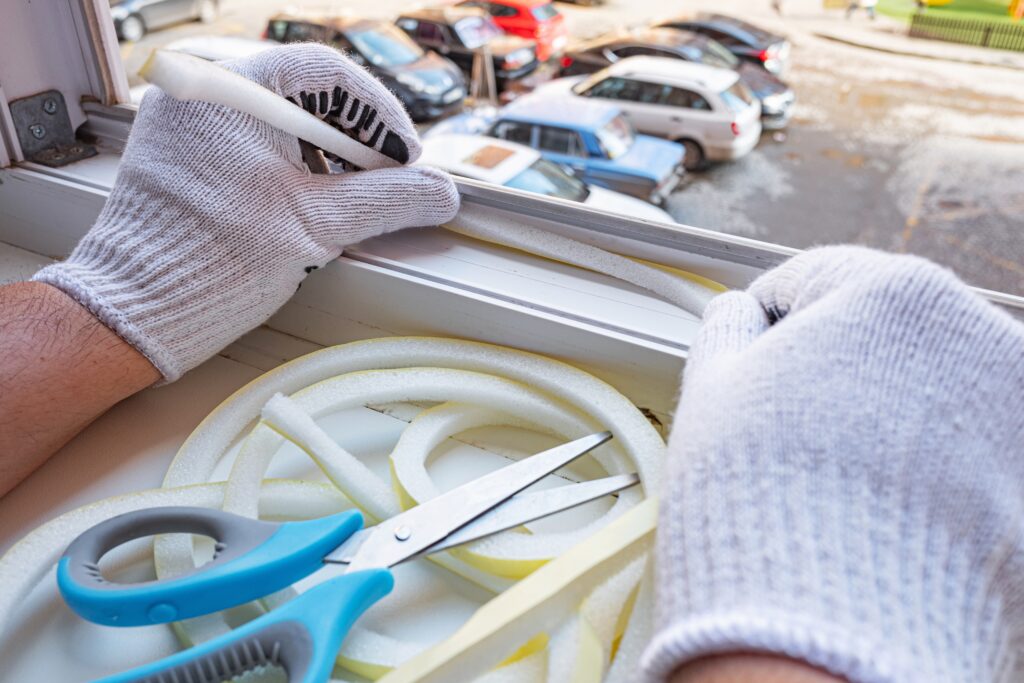
Insulation is a simple, cheap, easy (yet often overlooked) way to improve the energy efficiency of your home including its furnace.
Another common cause is air leaks. When there are gaps or cracks in your home’s windows, doors, or ductwork, cold air from outside can seep in, causing your furnace to work overtime to compensate for the loss of heat. These air leaks not only lead to higher energy bills but also result in an uncomfortable living environment.
Finally, aside from age, it’s also important to consider the general condition of your furnace itself. A poorly maintained furnace can experience issues such as dirty or clogged filters, worn-out parts, or malfunctioning thermostats. These problems can cause your furnace to work less efficiently and use more energy than necessary.
Yes, your furnace is an absolute requirement in the winter months. But it doesn’t have to consume your monthly heating bills.
By learning the cautionary signs, exploring the reasons behind poor furnace performance and implementing several solutions to mitigate these issues, you can ensure that your furnace is not stealing your hard-earned money through unnecessarily high energy bills. Taking proactive steps to maintain and optimize your furnace will not only save you money but also contribute to a more comfortable and energy-efficient home. So, don’t wait any longer—start implementing these solutions today and enjoy the benefits of a more efficient furnace and lower energy bills. Contact us today!
Are you worried that your water heater may be on its last leg? If so, then it’s important to be aware of the warning signs that could indicate a need for water heater repair. From strange noises to an unreliable hot water supply, there are several telltale indicators that can alert you to an impending water heater issue. Read on to discover five of the most common symptoms that signify you may need to have your water heater serviced.
If you find yourself waiting longer and longer for your water to heat up, it could be a sign that your water heater is in trouble. Increased heating time is a common symptom of a failing water heater, and it’s not something you should ignore.
There are a few reasons why your water heater might be taking longer to heat up. One possibility is that the heating element is wearing out or malfunctioning. Over time, the heating element can become coated with sediment, which reduces its ability to heat the water efficiently. Another possible cause is a buildup of mineral deposits in the tank, which can also hinder the heating process.
Regardless of the cause, if you notice that your water is consistently taking longer to heat up, it’s a good idea to have your water heater inspected by a professional. They can diagnose the issue and recommend the appropriate repairs. Ignoring the problem could lead to further damage and potentially even a complete breakdown of your water heater.
Rust or corrosion on your water heater tank can be a major red flag that your unit requires repair. While it may be easy to dismiss some rust or discoloration as normal wear and tear, it’s important not to ignore it. Rust can weaken the tank and cause leaks, leading to potential water damage in your home.
Corrosion can also be a sign of a failing water heater. It can indicate that the sacrificial anode rod, which is responsible for attracting corrosive elements in the water, is no longer functioning effectively. When the anode rod is depleted, the tank itself becomes vulnerable to corrosion.
If you notice any rust or corrosion on your water heater tank, it’s crucial to address the issue promptly. Call a professional water heater repair technician who can assess the situation and determine the best course of action. They may recommend replacing the anode rod or even the entire tank if the corrosion is severe. Acting early on can help prolong the lifespan of your water heater and prevent further damage to your home.
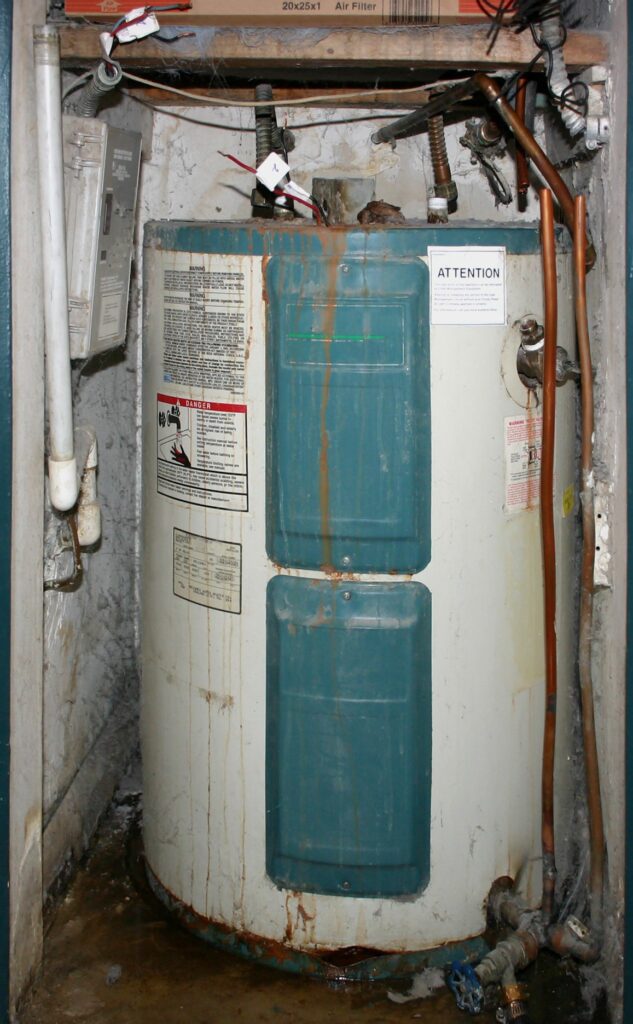
Rust and/or corrosion on your water heater is an indicator that something is likely wrong with the unit and requires immediate service and attention.
Is your water heater making strange noises that have you on edge? Don’t worry, you’re not alone. Strange noises coming from the tank are one of the most common indicators that your water heater needs repair. These noises can range from banging and clanging to hissing and popping sounds. While it may be tempting to ignore these sounds and hope they go away, it’s important to address them promptly to avoid further damage to your water heater.
One possible cause of these strange noises is a buildup of minerals and debris at the bottom of the tank. Over time, these items can accumulate, creating a layer of sediment that interferes with the proper functioning of the heater. This accumulation can result in the tank overheating, leading to those unsettling sounds. Another potential culprit is a faulty heating element or a loose part inside the tank.
Leaking around your water heater is not a symptom you can afford to ignore. Even a small leak can quickly escalate into a major issue, causing water damage to your home and potentially leading to costly repairs that are commonly not covered under insurance. If you notice water pooling around the base of your water heater or dripping from the pipes or fittings, it’s important to take immediate action.
There are a few potential causes of leaks around your water heater. It could be a loose or damaged pipe connection, a faulty temperature and pressure relief valve, or even a cracked tank.
If you see this occurrence, the first step to mitigation is to turn off the power and water supply to the water heater. This will help minimize any potential damage while you wait for a professional to assess the situation. They may need to replace a faulty valve, tighten loose connections, or, in some cases, replace the entire unit. It’s important not to attempt any repairs yourself, as working with water heaters can be dangerous without the proper knowledge and experience!
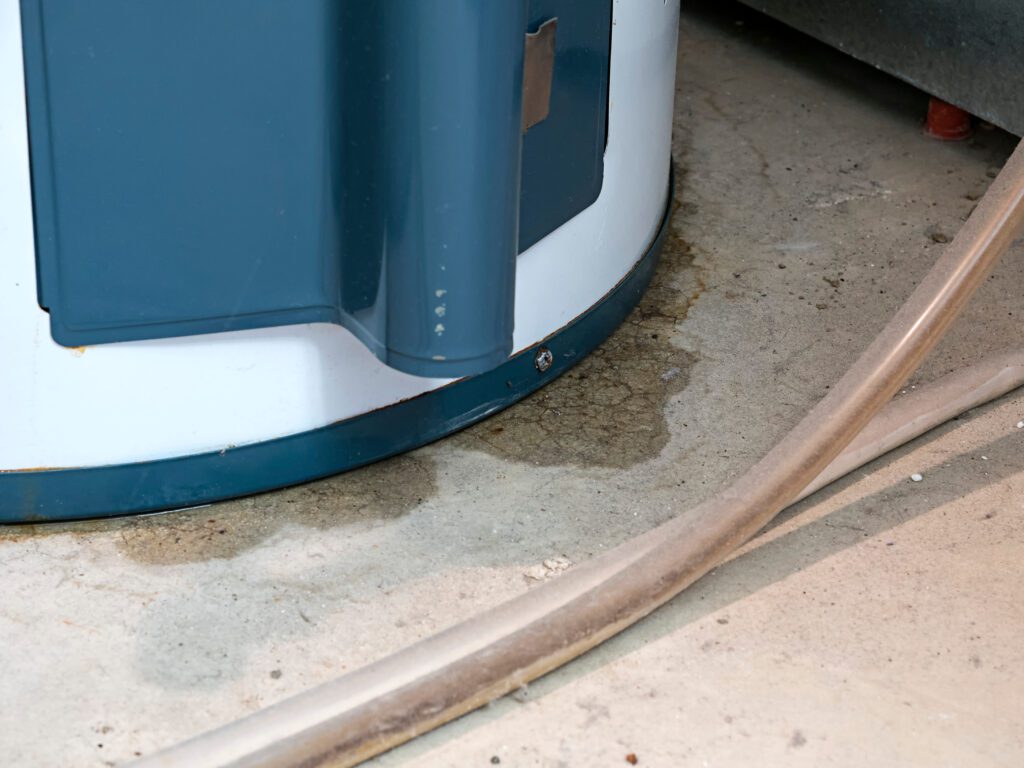
If you notice your water heater leaking, even a little bit, it could be a sign of something greater (and potentially more costly) about to occur. Call your local professional immediately!
Over time, your water heater will inevitably start to show signs of age. The average lifespan of a water heater is around 8 to 12 years, depending on the type and maintenance. As your water heater gets older, it becomes more prone to issues and inefficiencies. It’s important to be aware of the age of your water heater and the potential problems that can arise.
As mentioned, the most common issue with an older water heater is sediment buildup. Excess accumulation can hinder the heating process and decrease the efficiency of the unit, resulting in longer heating times, reduced hot water supply, and even strange noises. Additionally, an aging water heater may develop leaks or corrosion, which can lead to water damage in your home.
If your water heater is nearing the end of its expected lifespan, it’s wise to consider replacing it before it fails completely. Upgrading to a new, energy-efficient water heater can not only prevent unexpected breakdowns but also save you money on your utility bills.
There are several indicators that your water heater may need repair. From increased heating time to strange noises coming from the tank, these signs should not be ignored. Rust or corrosion on the tank and leaks around the water heater are also red flags that should be addressed promptly. Additionally, considering the age of your water heater is important, as older units are more prone to issues and inefficiencies.
If you notice any of these symptoms, act immediately. Ignoring the warning signs can lead to more extensive damage, costly repairs, and potential water damage in your home. Contact us today and we’ll be happy to review your situation with practical solutions for your budget and needs!
In this blog post, we’ll be discussing how to read your propane tank gauge to ensure you’re always prepared for whatever life throws your way.
A sump pump is a crucial asset for homeowners that can protect their homes from flooding and other water damage. In this blog, we will explain the importance of sump pump knowledge and proactive maintenance tips to ensure your family avoids unwanted home repairs and damage.
This question may seem obvious, but there are so many facets to sump pumps that can be easily overlooked.
A sump pump is an invaluable tool for homeowners, especially those living in areas prone to flooding or excessive groundwater. It is a mechanical device that is installed in a basement or a crawlspace to prevent water from accumulating and causing damage. Its primary function is to pump out water that collects in a sump pit, which is a small hole or pit located at the lowest point of the basement floor.
Did you know that over 60% of American homes experience some form of basement water problems? In states like Connecticut, where heavy rains and snowmelt are common, sump pumps play a crucial role in protecting basements from flooding. According to the National Association of Home Builders, Connecticut is among the top 10 states with the highest percentage of homes with basements.
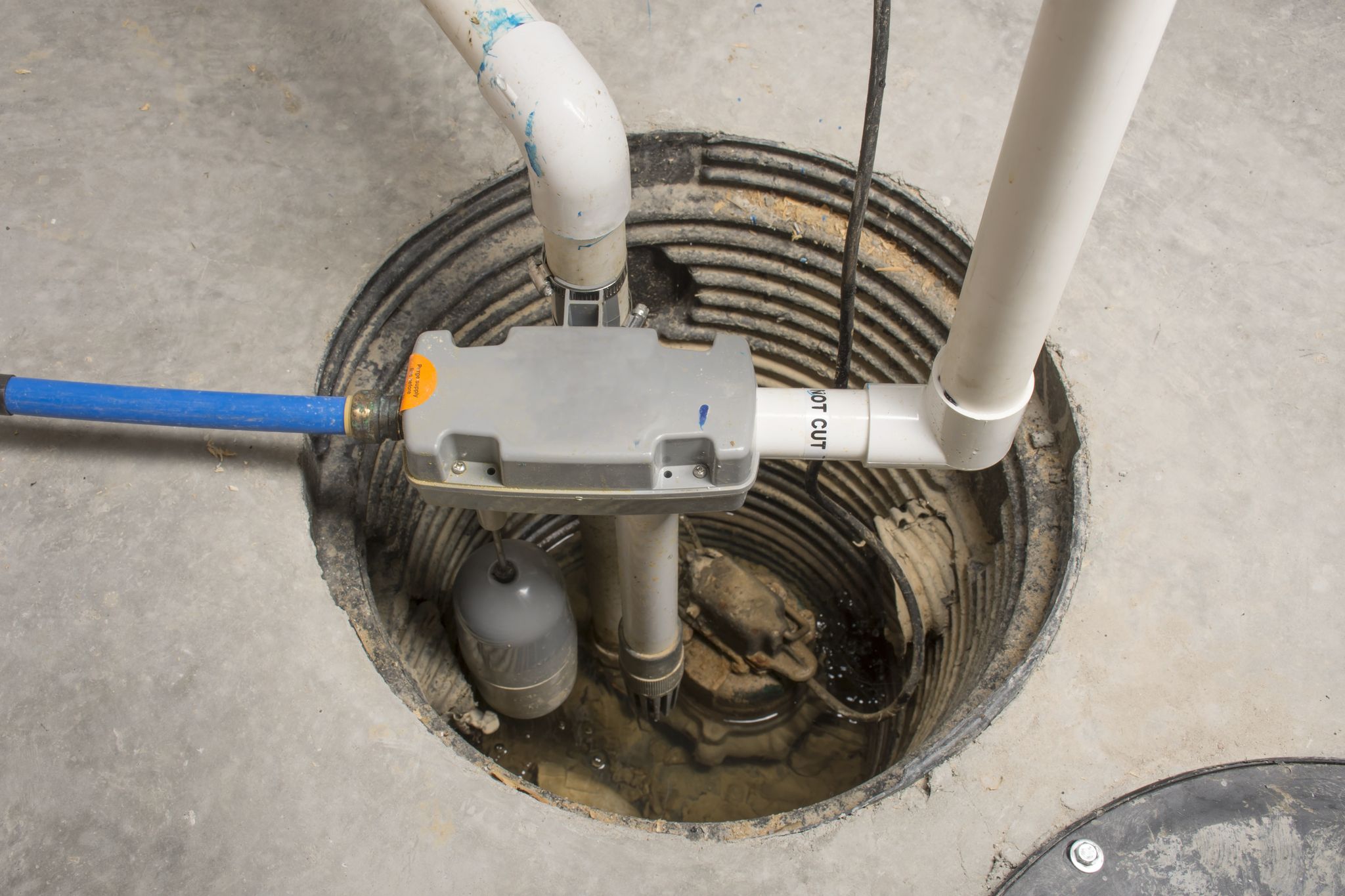
Sump pumps are a necessity when it comes to protecting your home from water damage, increasing filtration, and reducing runoff.
At its core, a sump pump is designed to remove water that accumulates in a sump pit, a small pit located in the basement or crawlspace of a home. The process begins when the water level in the sump pit rises to a predetermined level. This triggers a float switch or a pressure sensor, which then activates the pump. The pump, typically powered by electricity, consists of a motor and an impeller. As the impeller rotates, it creates a centrifugal force that propels the water through the pipes and out of the pit.
It is important to note that not all sump pumps are created equal. There are submersible pumps that are placed directly in the pit, as well as pedestal pumps that are installed above the pit. The latter is often easier to access for maintenance and repairs.
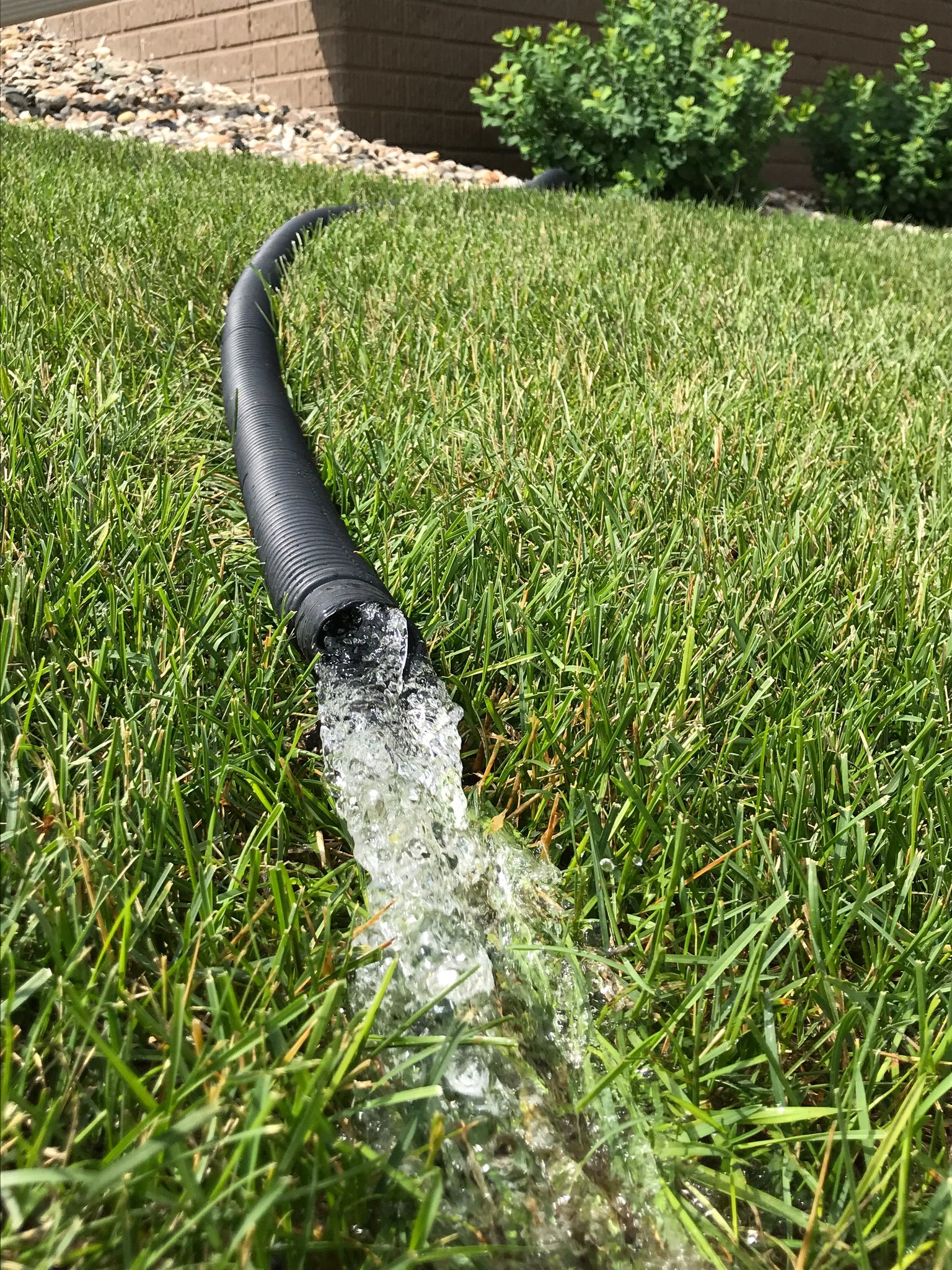
Sump pumps work by transferring the water to another point in the house or outdoors.
A sump pump provides a range of benefits that can protect your property and safeguard your belongings:
Valiant Energy Solutions has been a leader in sump pump installation and maintenance for many years. Our experienced technicians provide comprehensive sump pump services that can help protect your home from water damage. We also offer emergency services, so if the worst should happen and your sump pump fails, our team can be there to start the repair process. We also offer energy-efficient sump pumps that can help reduce your water consumption and save you money. By using the latest technologies and high-efficiency pumps, we can provide you with a reliable and efficient solution.
If you want to experience the highest performance possible with a reliable sump pump system, contact our team today to get your installation or maintenance scheduled. Our solutions experts are eager to speak with you about how the right sump pump can enhance your home.